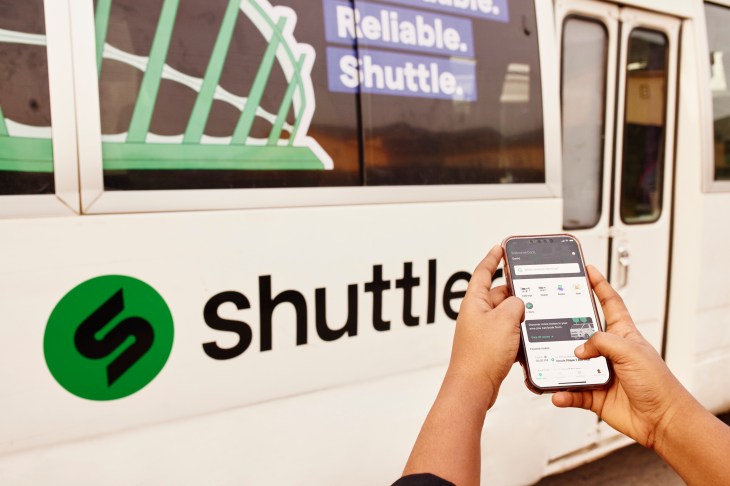
Image Credits: Shuttlers
Shuttlers, a Nigerian shared mobility company that allows individual and corporate passengers to take rides on multiple bus routes via an app, has raised $4 million in a new funding round led by Verod-Kepple Africa Ventures (VKAV), a Pan-African focused venture capital firm.
The round welcomed participation from follow-on investors, including VestedWorld, which led the mobility startup’s $1.6 million round 18 months ago. SheEquity, CMC 21 & Alsa, and EchoVC are the startup’s other backers in this round, which has seen the mobility company secure over $5.6 million in total venture backing.
Shuttlers’ business primarily focuses on corporate trips and commutes. In Lagos, Africa’s most populous city, the average professional who commutes to work daily or several times a week — whether with a personal car or danfo minibuses and okadas — meets roads riddled with intense traffic congestion and dangerous carbon emissions. Since transportation isn’t a common employee perk in Nigeria, what Shuttlers has managed to do since CEO Damilola Olokesusi launched the startup in 2016 is provide partner companies, in Lagos and Abuja, with a bus-sharing platform with mobility options for their employees.
With Shuttlers, these employees can book seats on one of the buses along predetermined and scheduled routes. Its other features include live bus tracking, optimal routing based on traffic, digital payments, and ride schedules. It has three payment plans: Companies pay full fare for employees, companies split fares with employees, and individual customers — unaffiliated with any partner company — pay fares themselves. The fares range from N850 (~$1.96) and N1300 (~$2.60).
Shuttlers has doubled down on traction since we covered its seed round in November 2021. Back then, the Lagos-based startup said it had over 100 buses plowing 30 routes across the city. Currently, nearly 260 buses go through 300 routes across Lagos and Abuja daily, according to co-founder and chief executive Olokesusi. Meanwhile, with a clientele of 80+ companies, including Interswitch, MainOne and Paga, the company sells over 9,000 tickets daily to individual and corporate passengers — and recorded 3 million B2B trips, per its website. The company claims to have 70,000 users while half that number have taken a ride on its platform.

Shuttlers founders
Bus-hailing platforms don’t contribute to inner-city congestion like the more popular shared mobility segment: ride-hailing services. Its model is such that more people are encouraged to take public transportation and decrease private car ownership. Thus, in addition to helping commuters alleviate the stress of driving to work or using disorganized public transport, Shuttlers is playing its part in decreasing pollution and congestion. The mobility upstart claims to have reduced its commuters’ carbon footprint by 85% (about 4 million pounds of carbon dioxide emission). The company’s environmental impact is one reason why lead investor Verod-Kepple backed it, according to partner Ory Okolloh, who said in a statement, “[Shuttlers’] commitment to creating impact aligns with our vision for investing in entrepreneurs who are solving significant challenges and companies who have a positive impact on society.”
Shuttlers’ seed round, which the company secured after bootstrapping for four years and processing over $1 million in transactions, afforded it room to improve its tech, Olokesusi told TechCrunch. Now this additional financing secured by the 55-man team will help build infrastructure to power its mass transit business, enable employee transportation for more corporates and increase market share in a space that includes Techstars-backed Treepz as it expands to other cities within Nigeria. It will also ramp up hiring in its sales, marketing and customer support departments, Olokesusi added.
“Before our first funding, when we didn’t do marketing and PR, I think we had the highest market share in bus hailing and sharing space. But now, there’s no doubt that we are miles apart from the competition, in terms of the number of customers, the technology and routes. We have built an infrastructure that allows us to expand into different geographies within and outside Nigeria and supports multiple stakeholders, from partners and drivers to marshals and administrative bodies. Our main focus is to take over the bus-sharing space and be this huge startup that, you know, is very profitable,” Olokesusi said about Shuttlers’ position in Nigeria’s bus-hailing market, adding that the startup intends to go live in five other cities across the country by next year.